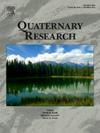Towards a better knowledge of the molar morphology and ecology of extant and fossil grass rats (Muridae: Arvicanthis Lesson, 1842)
IF 1.8
3区 地球科学
Q3 GEOGRAPHY, PHYSICAL
引用次数: 0
Abstract
Abstract African rodents of the genus Arvicanthis are presently restricted to sub-Saharan savannas and to the Nile Valley. In contrast, their distribution during the Quaternary included most of northern Africa, leading to the emergence of local fossil species. To date, there have been no comprehensive studies of Arvicanthis populations in northern Africa, neither to clarify their taxonomy nor their paleoecology. The present study aims to explore both morphology and diet of modern and fossil Arvicanthis species using geometric morphometric and dental microwear analyses on first upper molars. The geometric morphometric analysis efficiently discriminates the studied extant and fossil Arvicanthis species and allowed for the identification of probable geographical variations within the A. niloticus group. Although all extant species of the genus Arvicanthis are predominantly grass-eaters, microwear analyses also highlighted diet differences in various modern populations of A. niloticus, as well as paleodiet inferences in the A. arambourgi fossil species, but no clear link between molar size or shape and diet can be established. This work helps set the stage for a complete revision of the fossil remains of Arvicanthis from northern African Quaternary deposits, and for a better understanding of the geographical and temporal morphological variability of this genus in Africa.更好地了解现存和化石草鼠的臼齿形态和生态学(Muridae:Arvicanthis Lesson,1842)
摘要Arvicanthis属的非洲啮齿动物目前仅限于撒哈拉以南大草原和尼罗河流域。相比之下,它们在第四纪的分布包括北非的大部分地区,导致了当地化石物种的出现。到目前为止,还没有对北非的Arvicanthis种群进行全面的研究,既没有澄清它们的分类学,也没有阐明它们的古生态学。本研究旨在通过对第一上颌磨牙的几何形态计量学和牙齿微磨损分析,探索现代和化石阿氏菌的形态和饮食。几何形态计量学分析有效地区分了所研究的现存和化石阿氏菌物种,并允许识别尼罗阿氏菌群内可能的地理变异。尽管Arvicanthis属的所有现存物种都以草食为主,但微磨损分析也强调了尼罗A.niloticus不同现代种群的饮食差异,以及A.arambourgi化石物种的古饮食推断,但无法确定臼齿大小或形状与饮食之间的明确联系。这项工作有助于为彻底修改非洲北部第四纪沉积物中的Arvicanthis化石遗骸,以及更好地了解该属在非洲的地理和时间形态变异奠定基础。
本文章由计算机程序翻译,如有差异,请以英文原文为准。
求助全文
约1分钟内获得全文
求助全文
来源期刊

Quaternary Research
地学-地球科学综合
CiteScore
4.70
自引率
8.70%
发文量
57
审稿时长
3 months
期刊介绍:
Quaternary Research is an international journal devoted to the advancement of the interdisciplinary understanding of the Quaternary Period. We aim to publish articles of broad interest with relevance to more than one discipline, and that constitute a significant new contribution to Quaternary science. The journal’s scope is global, building on its nearly 50-year history in advancing the understanding of earth and human history through interdisciplinary study of the last 2.6 million years.
 求助内容:
求助内容: 应助结果提醒方式:
应助结果提醒方式:


